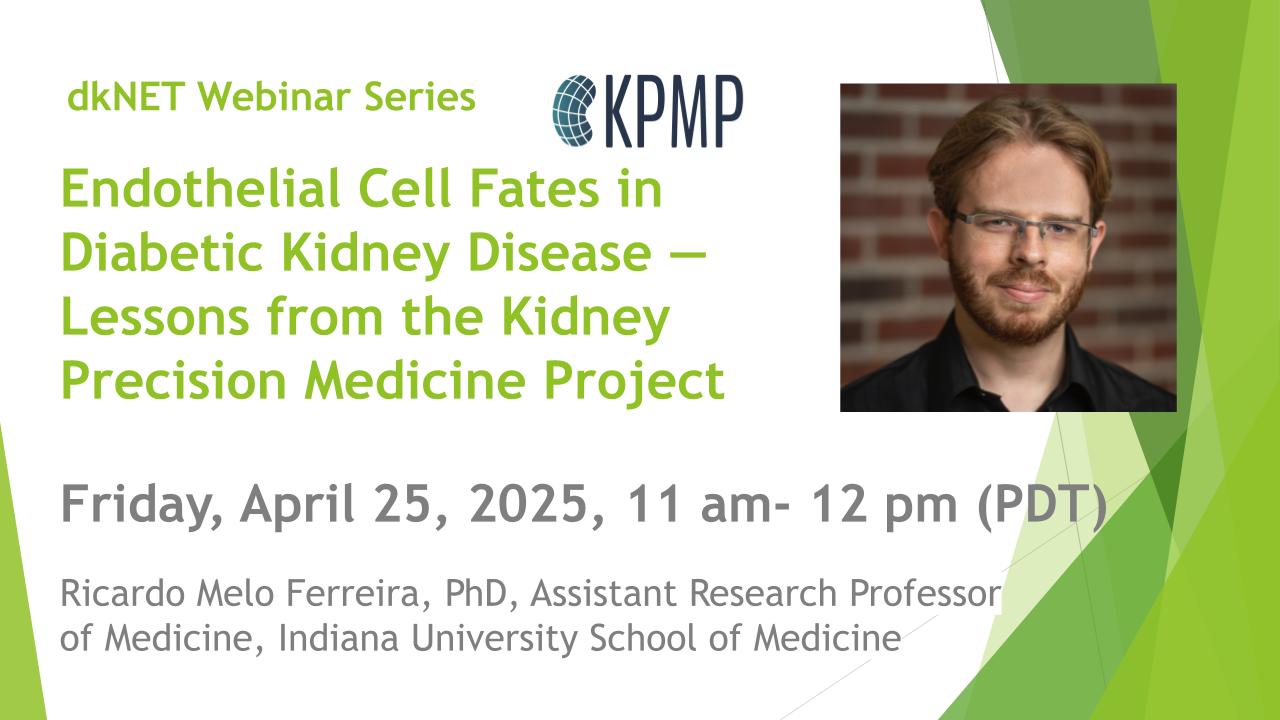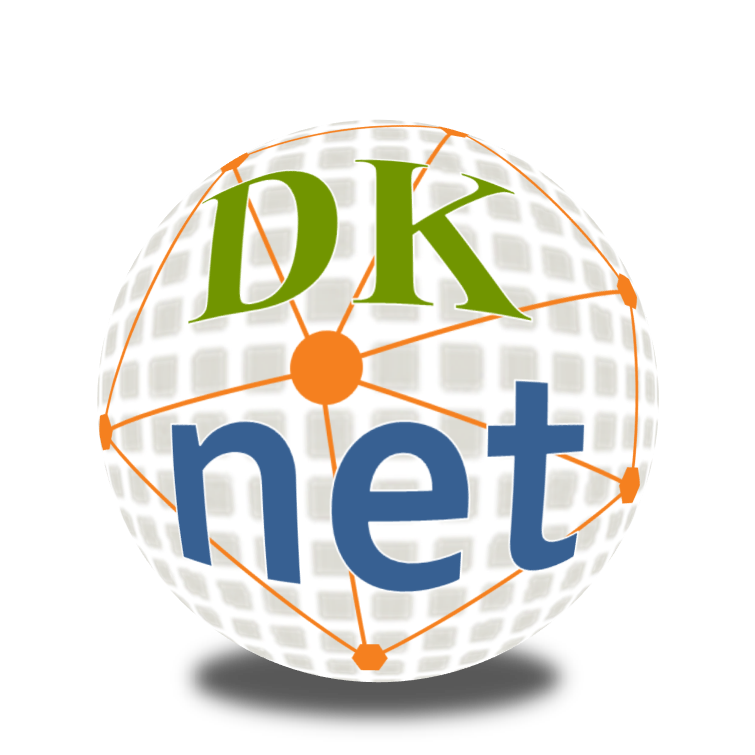Leaving Community
Are you sure you want to leave this community? Leaving the community will revoke any permissions you have been granted in this community.
dkNET community events and announcements in February, 2025
Dear dkNET Community,
dkNET provides updates on activities of interest to the NIDDK-supported community. You could keep up to date on these activities through our Twitter feed @dkNET_info, through our Community Calendar, or through dkNET e-mail list. If you have an event or funding opportunities you'd like to advertise, please contact us info_at_dknet.org.
dkNET News
- Upcoming dkNET Webinar: Join us for dkNET webinars (1) "National Institute on Aging (NIA) Alzheimer's Disease Data Center" on Friday, February 14, 2025, 11 am - 12 pm PT. (2) "Metabolomics Workbench" on Friday, February 28, 2025, 11 am - 12 pm PT (3) Pankbase Knowledge Graph" on Friday, March 14, 2025, 11 am - 12 pm PT. More information: https://dknet.org/about/webinar
Events in February 2025
Feb. 12, 2025
Diabetes Research Virtual Seminar Series: Developmental Programming of Neuroendocrine Integration
Presenter: Richard Simerly, PhD
Louise B McGavock Professor
Department of Molecular Physiology & Biophysics
Vanderbilt University School of Medicine
More information: https://diabetes-virtual-seminar.org/
Feb. 14, 2025
dkNET Webinar: National Institute on Aging (NIA) Alzheimer's Disease Data Center
Join dkNET Webinar on Friday, February 14, 2025, 11 am - 12 pm PT
Presenter: Li-San Wang, PhD, Peter C. Nowell, M.D. Professor and Vice Chair for Research, Department of Pathology and Laboratory Medicine, University of Pennsylvania Perelman School of Medicine
Abstract
In this talk, we explore the genomic frontiers of Alzheimer's research via the revolutionary Alzheimer's Disease Sequencing Project (ADSP; https://adsp.niagads.org). AD SP integrates together various components that collectively unravel the intricate genetic landscape of Alzheimer's disease with the ultimate goal of advancing precision medicine for the millions affected globally by this deva stating disease. With an eventual goal of sequencing and analyzing up to 150,000 complete genomes and associated clinical and functional data, ADSP has amassed an unprecedented wealth of genomic data from diverse population s, providing a comprehensive and holistic understanding of the genetic underpinnings of Alzheimer's disease.
This presentation highlights key components of the ADSP: (1) NIA Genetics of Alzheimer’s Disease Data Storage Site (NIAGADS; https:/ /www.niagads.org): As a national data repository, NIAGADS supports Alzheimer’s Disease and Related Dementias (ADRD) research with high-quality data collections, genome-wide association study (GWAS) summary statistics, and richly annotated genomic knowledge bases. (2) Diversity Initiative: The ADSP places a paramount emphasis on diversity, ensuring the inclusion of a wide range of populations in its genomic dataset. (3) Phenotype Harmonization: Harmonizing phenotypic data across diverse cohorts is a critical aspect of the ADSP, facilitating meaningful comparisons and analyses. (4) Functional Genomics: Moving beyond genetic variations, the ADSP incorporates functional genomics to discern the biological mechanisms at play. (5) AI/ML Opportunities: the focus of this session, we will start by illuminating the wide range of opportunities the ADSP offers to AI/ML researchers.
B y showcasing the tools and frameworks developed through the ADSP, this talk aims to inspire collaborations that extend beyond Alzheimer’s research, opening pathways for integrating genomic resources and expertise to advance research in diabetes, kidney disease, and other complex disorders.
The Top 5 Key Questions that Alzheimer's Disease Sequencing Project (ADSP) Resources Can Answer:
1. Where can researchers fin d key genes or pathways identified through the ADSP and how does the ADSP incorporate functional genomics with genetics to identify potential therapeutic targets?
2. What are the most promising AI/ML approaches currently being applied to ADSP data, and how might they be adapted to study diabetes or kidney diseases?
3. How does ADSP data support the development of predictive models for disease risk or progression?
4. Can tools developed for ADSP’s phenotype harmonization be applied to harmonize data for complex traits in diabetes or kidney disease?
5. How does the ADSP ensure diverse population representation in its datasets, and how can these efforts inform studies on genetic risks in underrepresented populations f or diabetes or kidney disease?
Dial-in Information: https://uchealth.zoom.us/meeting/register/x-98M_efRPSx0yfU cCOZGA
More information: https://dknet.org/about/webinar
Feb. 16, 2025
GRC Conference Application Due: IGF and Insulin System in Physiology and Disease: The Antagonistic Pleiotropy of IGF-1 and its Interactions with Insulin
The "IGF and Insulin System in Physiology and Disease Conference" convenes a diverse group of international researchers committed to advancing our understanding of the IGF axis's role in health and disease. Our program showcases a blend of emerging talents and renowned experts in the IGF field, featuring discussion leaders and presenters from institutions and organizations worldwide. This conference is designed to cultivate an interactive atmosphere conducive to deep discussions, the exchange of novel idea s, and the initiation of groundbreaking research collaborations. Participants will have the exceptional opportunity to partake in stimulating session s, gaining access to groundbreaking, yet-to-be-published research that is at the forefront of the IGF and insulin fields. Conference dates: March 16 -21,2025.
Location: Ventura, CA, USA
More information: https: //www.grc.org/igf-and-insulin-system-in-physiology-and-disease-conference/2 025/
Feb. 27, 2025
NIDDK Central Repository Webinar Series "Data Science Fundamentals”
This session is geared towards all researchers wanting a deeper understanding of the data science process and techniques within each step, such as:- Data Science Process; Problem Statement; Data Acquisition; Exploratory Data Analysis; Data Preparation; Modeling; Data Visualization ; Taking Action- Supervised, Unsupervised, and Deep Learning Techniques- Specialized data science topics, including computer vision, natural language processing, and time series- Data science in practice. This session will feature presentations by experts in data science at the Naval Information Warfare Systems Command (NAVWAR) 4.0 Data Science Learning Program.
More information: https ://repository.niddk.nih.gov/pages/webinars
Feb. 28, 2025
dkNET Webinar: Metabolomics Workbench
Join dkNET Webinar on Friday, February 28, 2025, 11 am - 12 pm PT
Presenter: Shankar Subramaniam, PhD, Distinguished Professor of Bioengineering, Bioinformatics and Systems Biology, Computer Science & Engineering, Cellular & Molecular Medicine, and Nano Engineering, University of California San Diego
Abstract: TBA
Dial-in Information: https://uchealth.zoom.us/meeting/register/SgG2fDHXRiOGpEZvGFXoGg
More information: https://dknet.org/about/ webinar
Funding Opportunities Information and Deadlines in February 2025
Feb. 06, 2025
NIDDK Funding Opportunity Application Due: Notice of Special Interest: Administrative Supplements to Support Emerging Physician-Scientists to Develop Research Expertise in Diabetes, Endocrinology and Metabolic Diseases
The purpose of the NIDDK’s Division of Diabetes, Endocrinology and Metabolic Diseases (DDEMD) Administrative Supplement Program is to enable additional clinical perspectives to be brought to on-going research projects within the Division's mission and to enhance the research expertise of selected physicians. The program will provide supplementary funds to support advanced research opportunities for exceptional emerging physician-scientists (hereafter, "candidates") holding the MD or equivalent or MD/PhD degrees, and who are early in their research careers. The supplement is intended to allow candidates to expand their research experience to help the m transition beyond their clinical training to the next stage of their rese arch careers as physician-scientists. Administrative supplements must support work within the scope of a currently funded basic and/or clinical DDEMD research project. PIs of projects focused on type 1 diabetes are highly encouraged to apply given the limited numbers of new MD researchers entering this area. All applicants are strongly encouraged to discuss potential requests with the NIDDK DDEMD program director of the award for which they wish to submit a supplement application. See https://www.niddk.nih.gov/about-niddk/staff-dire ctory/by-office/division-diabetes-endocrinology-metabolic-diseases for DDEMD program director contact information. Application Due: February 6, 2025.
More information: https://dknet.org/about/dknetnews/2780
Feb. 14, 2025
IIDP Funding Opportunity Application Due: 2025 IIDP Data Resource - Trainee Scholar Award (DRTSA) and the Data Resource Award (DRA)
The Integrated Islet Distribution Program (IIDP) announces two new funding initiatives, the 2025 IIDP Data Resource - Trainee Scholar Award (DRTSA), that is intended to advance research in human pancreas biology by providing trainees with support and access to detailed donor and islet data contained within the IIDP’s Research Data Repository (RDR) that will enable important secondary analyses to explore the relationships among donor characteristics, islet phenotyping, and genetic risk. Studies supported by these awards should focus on key questions in pancreatic research. IIDP data, including detailed donor, islet isolation, and post-shipment phenotyping data, will be made available to award recipients via the IIDP’s Research Data Repository (RDR). A comprehensive list of data points available via the IIDP’s RDR can be viewed here: https://iidp.coh.or g/Investigators/Research-Data-Repository. Another initiative is the 2025 IIDP Data Resource Award (DRA), that is intended to advance rese arch in human pancreas biology by providing new principal investigators with support and access to detailed donor and islet data contained within the IIDP’s Research Data Repository (RDR) that will enable important secondary analyses to explore the relationships among donor characteristics, islet phenotyping, and genetic risk. Information Webinar: December 6, 2024, 12 pm PT; Letter of Intent due date: December 16, 2024; Application Due Dat e: February 14, 2025.
More information: https://dknet.org/about/dknetnews/2795 ; https:// dknet.org/about/dknetnews/2796





